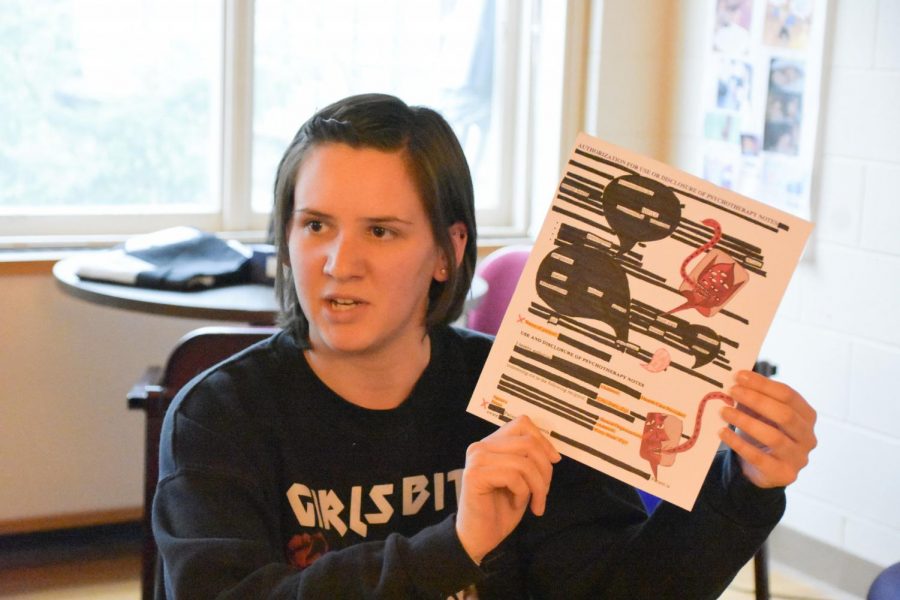‘Reproductive writes’ analyzed with blackout poetry
UWO alumna Brooke Berrens participates in blackout poetry for reproductive rights on Thursday.
May 9, 2019
The UW Oshkosh Women’s Advocacy Council worked with the Assisted Reproductive Technology of Infertility last Thursday to relieve stress before finals and educate the community about reproductive rights.
Dr. Maria Novotny is from the English department and is a co-founder of the ART of Infertility. She explained the organization’s goals with educating the public and advocating for reproductive rights.
“It encompasses rights to alternative family building, things like adoption and fertility treatments,” Novotny said. “There are a lot of laws that can regulate how one can access either fertility treatments, because fertility treatments out-of-pocket is normally around $25,000 — and adoption — that costs out-of-pocket like $30,000 for a domestic adoption.”
WAC and the ART of Infertility came together in the Women’s Center to create blackout poetry, which is selecting words from an article or other piece of writing to create something completely new.
Novotny also explained the importance of bringing new meaning to different texts.
“Blackout poetry is where you work with a variety of different texts — Cosmos or consent forms for therapy or medical procedures — they’re supposed to represent your rights but are use really dehumanizing language,” Novotny said. “It’s a way to put the person back in it. You circle a bunch of words that speak to you. Reproductive healthcare doesn’t just impact your body parts, it also affects your mental capacity, all that.”
Senior social work major and co-director of WAC and Women of Color Ally Megan Richard said that reproductive health should be taken care of like any other part of the body.
“Reproductive health is really important because you don’t want people to go through really dangerous measures to get something you don’t want anymore out of [your body],” Richard said. “It should be accessible. It should be taught. Not everybody wants to have kids. Reproductive health can be for everybody; it doesn’t just have to be for women.”
Novotny said learning about reproductive rights is still very important despite being in college.
“You’re not thinking about infertility or how you might come into some sort of obstacle to building a family,” Novotny said. “We make it broad in terms of your access to reproductive choices and health care.”
Senior anthropology student and co-director of WAC Paris Larson shared how infertility has affected her family’s history.
“I know my grandmother had infertility problems, and she had to go through years of hoops and interviews and ended up [adopting] my father and his brother from North Carolina,” Larson said. “It shouldn’t have to be going all the way to North Carolina [from Wisconsin] to adopt a kid.”
Larson also talked about the expenses for any kind of fertility treatment because the cost may not always be handled through insurance.
“If someone is infertile but wants to have their own child, the infertility treatment is tens of thousands of dollars, and insurance won’t cover it,” Larson said. “I feel like if your body is supposed to do that, and if you want your body to do that, you shouldn’t have to pay tens of thousands of dollars for it.”
Richard talked about what reproductive rights and health means to her.
“I don’t want kids, and I like to have the peace of mind that I can have control over my body,” Richard said. “I think that’s really freeing to me. That should just be how it should be. Yes, you can have babies if you want, and you don’t have to have babies. You take care of your health, why not take care of your reproductive health?”














